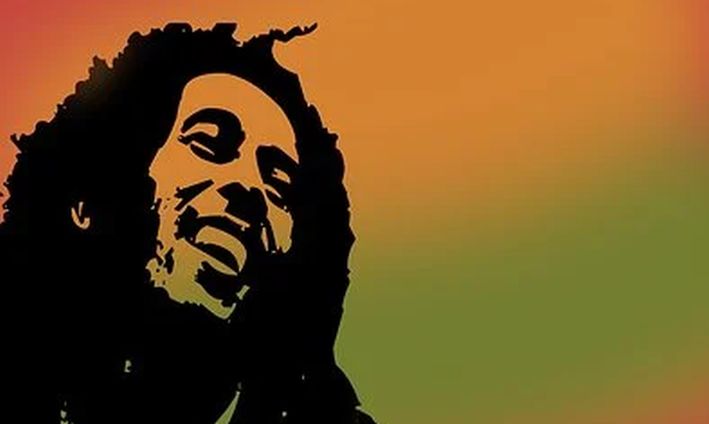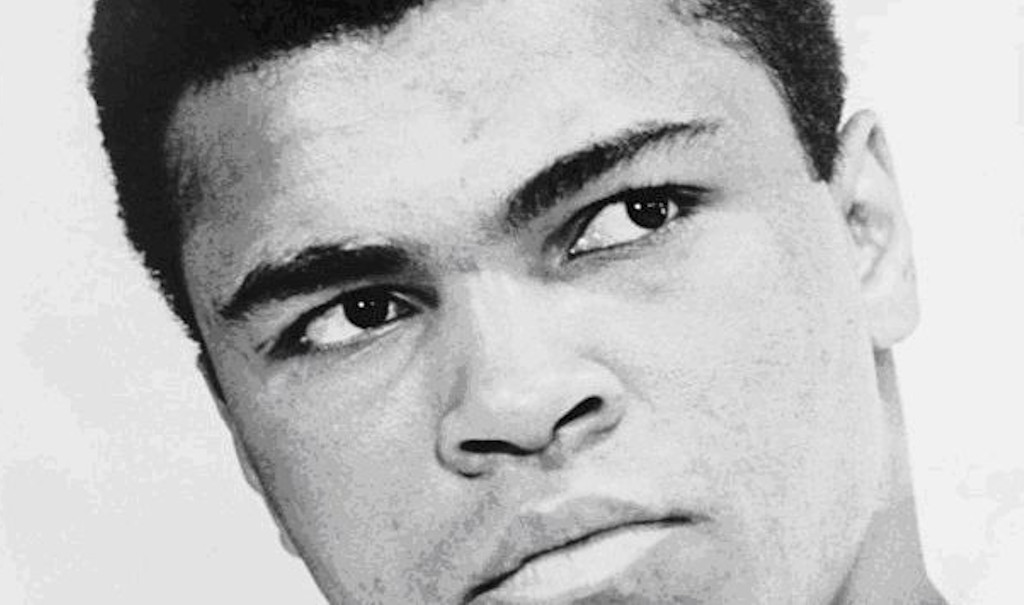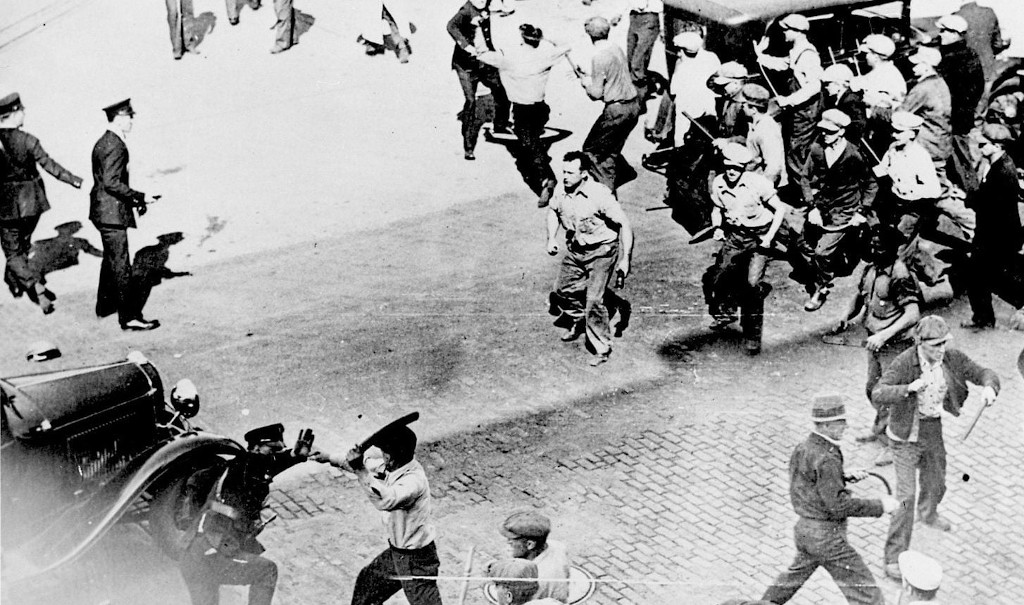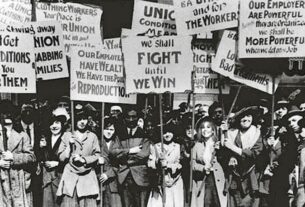Jason Toynbee is a member of Socialist Alternative (England, Wales & Scotland).
40th anniversary of his death
Bob Marley died forty years ago, on May 11, 1981. It’s an extraordinary fact, but today he remains the only global superstar from the neocolonial world. Not only that, he is the only global superstar who achieved success by writing and performing songs of resistance to the system under which we live, namely capitalism. This makes him an important figure for socialists. How was he able to make his way from Jamaica through the international music industry onto the world stage? And what political lessons can we learn from his life and work?
Born in a remote hamlet in the jagged hill country of north central Jamaica, Bob Marley was the son of a young women from a peasant family and a white colonial administrator stationed in the area. His father left soon after Bob was born, and the lad ended up spending much of his childhood in the impoverished government housing project of Trenchtown in Kingston. The hard early experience of being mixed race in an oppressed black community where light skin usually signified power and wealth no doubt contributed to his self-reliance. He had to fight to prove himself. Yet the “Tuff Gong” as he would later be called also nurtured an extraordinary sense of how human beings might flourish together if it wasn’t for the brutal oppression of “Babylon system.”
This combination of rugged materialism, spirituality and solidarity would shape Bob’s approach to making music throughout his short life. Yet it would be a mistake to see him as a lone genius. Crucially he came up through a music scene in which petty capitalist competition and musicians’ collective practice came together in a pulsing dialectic of creativity.
As Bob started to make music in the early 1960s the main form of entertainment for the black Jamaican working class was the dance hall. Here people gathered to dance to recorded music on weekends. The records were provided mainly by three major mobile sound systems whose operators also owned studios and hired singers, song writers and musicians for recording sessions.
Competition between the operators was intense and the fortunes of a “sound” depended entirely on its ability to keep audiences moving on the dance floor by constantly playing new records. In order to ensure exclusivity operators often scratched out or used blank labels to prevent competitors from finding out who the musicians were.
This was the music scene that Bob and the other Wailers entered as they began to record for sound system operator “Sir” Coxsone Dodd and his Studio One label in 1964. Their first release, “Simmer Down”, was very much a song of the moment, an appeal to the “rude boys” of the Kingston gangs to stop their street fighting. More than this, though, Bob’s vocal was a call for solidarity and working class unity in the face of division. The tune was also a driving dance floor hit. On the evening of the recording session Bob watched Sir Coxsone play a first pressing at a dance, and saw crowds surge onto the floor as the record dropped for the first time.
This is key. In the cultural laboratory of Kingston in the 1960s new records were not only made and released in a matter of hours, musicians’ skills grew at an exponential rate and new styles burst through as technique and style were shared and honed. From ska to rocksteady to reggae the Wailers were at the forefront of this people’s musical explosion. They never prospered however. Like most of the Jamaican singing groups they lived from hand to mouth, while session musicians made a very modest living, and Kingston’s music bosses pushed and shoved for top position and top dollar.
By the late 60s Jamaican music was starting to sell in the UK, and not only to migrants from the island who had been arriving since 1948, but to white working class youth too. After working for other producers (and with their own label for a short period) the Wailers tried to breakthrough in this new international market, but with little success.
What changed everything was a chance encounter between Bob and the Jamaican owner of the Island record label in London in 1972. From a bourgeois, English colonial family Chris Blackwell had set up the company in Kingston in 1958 before decamping to London two years later. By 1972 Island was a successful rock label and Blackwell’s big idea was to market Bob and the Wailers to rock fans using an album format. The band’s repertoire of songs of protest, spirituality and love would be repackaged via rock production and sonority, including lead guitar and funky keyboard sounds.
Bob in particular among the Wailers was an active collaborator in this remaking. On a mission to reach the enormous audience for black music in the US, the Island deal would be a stepping stone. In the meantime clad in denim he became the leader of reggae-rock band which could play concerts as well as make records, and so build a new audience of mainly white youth.
There was always a twist to this. Bob’s music included beautiful, often wistful love songs as well as songs of spiritual healing. But what really marked out his work was its political content. The struggle of the Jamaican masses against colonialism and, after independence in 1962, the neocolonial rule of the mixed-race, rentier middle class had a major impact on his writing. Like many Jamaican youths of his generation this militancy was refracted through Rastafari. A religious movement with a god-on-earth in the shape of Emperor Haile Selassie of Ethiopia, Rastafari had always been political too in that the object of its contempt was not a supernatural devil but “Babylon,” the capitalist colonial system which “downpressed” the impoverished black masses of the Caribbean and indeed the whole world.
Undoubtedly Bob’s increasing international success from 1972 onwards was in large part due to the political songs of resistance he sang. As Klive Walker has pointed out these kept on appearing, and contrary to received opinion, songs about the need for social change made up the majority of his later work. In an important sense, then, Bob Marley never “sold out.” And despite his being repackaged as a spliffed-out “natural mystic” by the music industry after his death, it is the advocacy of struggle through music that he is mostly remembered for.
“Get up, stand up, stand up for your rights / Get up stand up, don’t give up the fight.” The words and that thumping, stuttering bass line come bursting out of speakers in a packed student bedroom in 1973. I’m thrown against the wall, shaken up – most of all I’m politicised! Sure, I already think of myself as a socialist, but Get Up, Stand Up convinces me that it’s not only right but righteous to fight for change. And that’s surely the point. Thousands, maybe millions, of people over the years since have been inspired and spurred to action by Bob Marley’s message that the world must be transformed. The problem is: how?
During the 1970s the Caribbean, just like the rest of the planet, entered a period of intensifying class struggle. As the post-War “Golden Age” of relative prosperity ground to a halt and capitalism fell into protracted crisis, the working class and exploited masses everywhere fought back to try and hold onto their share. In Jamaica “democratic socialism” moved centre stage as the People’s National Party of Michael Manley came to power. In government it moved decisively to the left on a program of nationalisation, job creation and public education while the Jamaica Labour Party, more clearly representing the post-independence, mixed race ruling class, fought to preserve capitalism and the status quo.
Bob and the Wailers had once played for the PNP – on the back of a truck in the election campaign of 1972. But as the decade rolled on and the fight for socialism became more intense he was reluctantly thrust centre stage in national politics. Based in Kingston and by now an international star he organised two huge outdoor events in the city. They were planned by Bob and his circle as ways of breaking out of the cycle of violence into which Jamaican politics had descended.
As in so much of the neocolonial world, bourgeois democracy had never been fully established in Jamaica. During the 1970s the growing power of gangs in Kingston led to a form of “client” politics in which dominant gangs and their bosses (the doms) became aligned with the two main parties. In the neighbourhoods which they controlled the doms would gain political favours in return for supporting a party and delivering votes for it at election time. As the political stakes rose the gangs fought more and more bitterly for control of the streets and for political sway.
Determined to overcome the violence that wracked Kingston through his personal charisma and the power of his music, Bob tried to mediate between leaders of the JLP and PNP gangs. But the logic of the system was against him. Intended as a way of building reconciliation the “Smile Jamaica” concert he planned for December 1976 actually became a cause for escalation of the violence. Two days before it was due to be staged gunmen burst into Bob’s uptown, Hope Road compound and shot and wounded Bob and Rita Marley, and manager Don Taylor. This was probably the work of the pro-JLP gang led by Claudie Massop, and designed to put a stop to a concert which, given Bob’s previous affiliation, might appear to favour the PNP. The tactic didn’t work – a heavily bandaged Bob Marley managed to perform at the gig. Afterwards, however, he fled Kingston with the Wailers for a long stay in London where they made the Exodus and Kaya albums.
By early 1978 Bob was back in Jamaica ready to try again. This time his negotiations with gang bosses were more successful. The One Love concert as it was called went ahead smoothly, and at the high point of the concert Bob brought the party leaders on stage. One at each side, he raised their arms and clasped their hands together in his. Concert footage shows them looking down awkwardly.
What are we to make of Bob’s foray into politics through musical ritual? In an obvious sense the idea that an isolated mass event in the shape of a concert can change popular consciousness or bring together implacably opposed politicians is naive. It implies that there is a way of transcending historical, class struggle.
In fact on the ground gang violence increased as Jamaica entered a period of intensifying economic crisis from the mid-1970s onwards – including inflation and a huge rise in unemployment. The left in the PNP correctly called for a mass mobilisation. Party activists should go out around the country building support for nationalisation, planned production, and workers and community councils. Perhaps partly in response to this leftward shift in the ranks of the PNP, in early 1977 Jamaica’s major creditor the IMF ratcheted up the pressure by demanding that the government drastically cut public spending and abandon nationalisation. Non-compliance would be met with foreclosure on the IMF’s loans — a bitter taste of neoliberalism to come. The PNP leadership rejected these demands and instead took up the left’s program for a mass mobilisation. However hardly had Prime Minister Manley endorsed the new program than he switched back, conceding to the IMF and reversing the attempt to build a grass roots movement.
Jamaica’s experiment in “democratic socialism” was now over. A combination of pressure from international capitalism, gangsterism (itself the legacy of colonialism) and loss of nerve on the part of a reformist leadership had condemned it. Of course Bob Marley could never have prevented the capitulation, even if he’d had an analysis of it. For while music can be an inspiration for struggle it can never substitute for a workers’ movement with a socialist program. Except for a few fated weeks that was exactly what was lacking in the PNP’s project of democratic socialism.”
For all that Bob Marley’s message remains crucial. However unfocused it might have been his idea of system change arising from the material conditions of the world as it is lived and experienced by ordinary people chimes with Marxism. That’s no coincidence. Bob was himself a product of the historical conjuncture, that moment in the 1960s and 70s when revolution was in the air and Marxist ideas were spreading among the exploited masses of the world.
In the last few years of his life he shifted his attention to Africa. In 1980 he played a concert in Zimbabwe to celebrate independence, and the following year released the album Survival with a strong pan-African theme. But time was running out. A football injury (Bob was a fanatical player) became cancerous. Bob, in common with many Rastas, saw conventional medicine as the work of Babylon and would accept only an alternative treatment based on diet and herbal infusions. His condition worsened rapidly and he died in Miami en route for Jamaica.
His body was taken to his birthplace, Nine Mile, and at a huge celebratory rite there was an outpouring of grief and veneration from the “sufferahs,” the Jamaican masses. It was mirrored around the planet. In the mere thirty six years of his life Bob Marley had not only achieved fame among millions of ordinary people but had also become a beacon of hope for a world transformed. The flames still flicker today.




